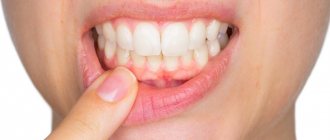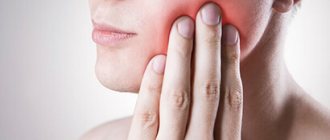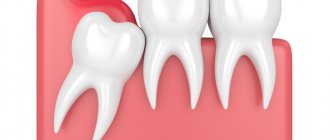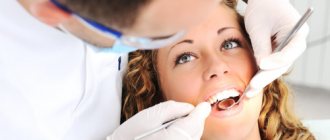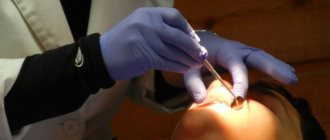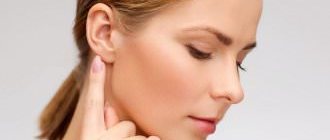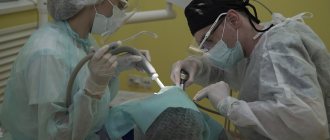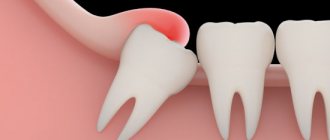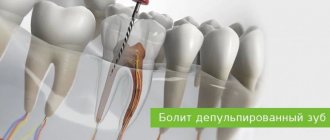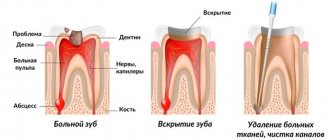22.11.2019
Dentists hear complaints that a tooth hurts when lying down quite often. “Strange” pain, which causes bewilderment in the patient himself, leaves no doubt in the doctor: before him is a person with an inflammatory disease. But why does pain occur only in a lying position and is practically not felt in a sitting or standing position?
Causes
The circulatory system and… are responsible for such a specific manifestation of pain. gravity. When you lie on your side, blood flows under the influence of gravity to the lower part of the body (lower - in relation to the surface on which you are lying).
This causes the tissues of the lower body to become compressed by the blood flow. In good health, you will not even notice this “gravitational effect”, since it is compensated by intracellular pressure. But when inflammation develops in the tissues, they swell on their own. And the nerve fibers located in such a pathological focus are pinched and begin to signal pain. When pressure on the nerves increases due to blood flow, the signal correspondingly becomes even stronger.
The mechanism of pain, which appears only in a lying position (or sharply intensifies in a horizontal position) is the same for all inflammatory processes - it does not matter whether the ligaments are inflamed after an injury or the nasal mucosa during a runny nose.
But when such pain appears in a tooth, the causes may be the following diseases:
- acute or chronic pulpitis (inflammation of the pulp);
- periodontitis (inflammation of the supporting apparatus of the tooth);
- periodontitis (inflammation of the tissues surrounding the tooth root and root membrane);
- periodontal abscess (purulent formation at the root of a tooth);
- periostitis (inflammation of the periosteum of the jaw);
- tooth root cyst.
All of these diseases have one thing in common. They are accompanied or caused by inflammation of the tooth tissue or tissues surrounding the tooth, and the rush of blood to these areas leads to increased pain.
What are the reasons for toothache when pressing?
Several factors can cause toothache when pressed. Among them are:
- developing dental caries (deep or medium).
The development of dental caries is a very long process. For some time, a person may not even notice it, since caries can appear on fillings. A tooth that causes discomfort looks completely healthy on the outside, but pain is felt when pressing on it. - pulpitis
. If the patient does not take care of caries treatment in advance, there is a high probability of pulpitis. Pulpitis is an inflammation of the nerve of the tooth, perhaps one of the most common moments when you have to visit the dentist. Pulp pain is characterized by sharpness, for this reason they are often called “lumbago.” The nerve bundle of the tooth is very sensitive to any inflammatory process, so it is very difficult to endure such pain for a long time. You should not use painkillers for a long time; an immediate visit to the dentist is required.
- tooth damage
. Damage to the hard tissues of the tooth can be caused not only by mechanical impact on it. Tooth trauma is often associated with treatment of neighboring teeth, which damaged the enamel. Moreover, if the crack is deep, the tooth will react painfully to any external factors: food, hot and cold drinks.
- periodontitis of the tooth
. Periodontitis occurs in case of poor-quality treatment (poor canal filling, violation of the tightness of the filling, lack of proper disinfection, etc.). In this case, when pressed, the tooth begins to ache. Thus, even in the absence of a tooth’s nerve ending, it can cause significant discomfort to its owner. You should not delay visiting your doctor, because such toothache can lead to serious complications, for example, the development of a cyst or granuloma.
When the first signs of periodontitis occur, it is recommended to adhere to the following rules:
- It is strictly forbidden to place warm (heated) objects on the diseased tooth;
- take painkillers orally (analgin, tempalgin, etc.);
- rinse your mouth with a concentrated solution of soda or calcium at least 3-4 times a day;
- Avoid using antibiotics (without prior consultation with your doctor).
Be that as it may, you should not treat a diseased tooth at home. Take a pain reliever and make an appointment with your dentist. Only a qualified doctor is able to make an accurate diagnosis and carry out treatment.
Symptoms
Recognizing the pain that occurs in a lying position is not difficult. It occurs 5-7 minutes after you lie down in bed, on your side. At the same time, the time of day does not matter, and changing the position of the body after the same time leads to a weakening of the pain or its complete disappearance.
But besides this, pay attention to the following symptoms indicating the development of dental pathologies:
- bad breath, which appears regardless of the quality of oral hygiene or menu features;
- changes in the gums (looseness or swelling, darker or paler color, bleeding);
- the appearance of a dark spot on the tooth, which increases in size and deepens over time;
- pain or discomfort during chewing;
- increased tooth sensitivity to sweets and sours.
Each of the listed symptoms in combination with pain while lying down indicates the need to consult a doctor. He will determine the true causes of this set of symptoms and prescribe appropriate therapy.
Let's look at the main dental diseases
1. Deviations in the eruption and formation of teeth.
If dental abnormalities are detected early enough, they can be successfully corrected. If teeth erupt incorrectly or asymmetrically, you should contact an orthodontist. X-rays are used for diagnosis. Such defects include:
- edentia, absence of teeth, hereditary disease, sometimes from birth a person does not have the rudiments of teeth;
- hyperdontia, excess teeth that can grow in the dentition and beyond - not in the palate or on the gums;
- impacted teeth that have not erupted and remain in the bone tissue, which often happens with wisdom teeth;
- dystopic teeth that have grown in the wrong places, at an angle, partially erupted, which happens with wisdom teeth;
- macro- and microdentia, teeth larger or smaller than necessary.
2. Diseases of tooth enamel.
The enamel on the teeth wears away under the influence of chemical processes occurring in the mouth. Food contains acids and dyes, and cleaning products change the mineral composition of teeth. Failures in the endocrine system and work in harmful conditions add to the adverse effects. Main enamel diseases:
- fluorosis associated with excess fluoride in drinking water, causing teeth to turn yellow;
- hypoplasia - a violation of the formation of the enamel structure that appears in the first months of life;
- a wedge-shaped effect, in which a protrusion develops at the neck of the tooth, because of which the entire coronal part can break off.
3. Caries with complications.
This disease is caused by microbial plaque on the teeth. Whether the disease will manifest itself largely depends on the personal properties of the dental tissue and the entire organism. It all depends on the composition and structure of the enamel, its mineralization and the characteristics of the structure of the teeth - bite, arrangement of teeth, structure of the jaws. The main diseases of this type are:
- caries is a pathological process caused by the deprivation of minerals by the enamel with the formation of a cavity, which, if left untreated, turns into pulpitis and periodontitis;
- pulpitis is a disease of the nerve in the tooth, it becomes inflamed, acute pain radiates to the temples, tooth loss is possible;
- periodontitis - inflammation of the upper part of the tooth root, which can develop into a cyst or abscess, accompanied by swelling of the gums and an increase in temperature;
- periostitis, or flux, appears when periodontitis remains untreated, the periosteum becomes inflamed, the gums become swollen and very painful;
- granuloma - the growth of inflamed tissues of the tooth root, the gums swell, the tooth hurts, if left untreated, a cyst, fistula and root diseases may develop;
- cyst - a purulent capsule of the upper part of the root, the result of infection penetration into the dental canal, has no symptoms, is detected by x-ray.
If you show signs of any dental disease, consult a doctor immediately. He will examine the oral cavity, conduct a diagnosis and outline a treatment plan, after which your health and beautiful smile will be restored.
Complications
The most obvious complication of such pain is a severe decrease in a person's quality of life. Complaints that “The tooth only hurts when I lie down” can also be translated as “I can’t sleep.”
Without proper rest, sooner or later the body’s nervous resources are depleted, and pain is accompanied by neuropathic disorders, sudden mood swings, irritability or apathy and other disorders that in one way or another affect a person’s life and his relationships with others.
But the dental range of complications is no less impressive. These include the development of a purulent process and the release of infection into the bloodstream; spread of inflammation to the soft tissues of the face, lymph nodes and much more.
Throbbing after dental procedures
Throbbing pain in a tooth can occur after the installation of a filling, tooth extraction, crown fixation and orthodontic treatment.
Throbbing pain occurred after tooth extraction
Painful sensations after the end of anesthesia and tooth extraction are a normal reaction of the body to a traumatic procedure. To eliminate “twitching”, painkillers are allowed in the first 1-2 days. The intensity of the pain gradually, the discomfort goes away within 3-4 days. After the removal of wisdom teeth and molars (6th, 7th and 8th teeth), the gums hurt and pulsate a little longer.
Increasing pain after removal of a dental unit may indicate the development of alveolitis. Inflammation of the dental socket develops due to the left fragment of granuloma (periodontitis) or root fragment. However, in most cases, alveolitis is caused by premature washing out of the blood clot and infection of the wound.
Important! It is prohibited to actively rinse your mouth after tooth extraction.
Tooth pulsates after filling
The dentist placed a nerve-killing drug into the root canal and installed a temporary filling. Do not panic if you experience throbbing pain from time to time for 3-4 days. However, if discomfort lasts longer, it is necessary to visit your dentist unscheduled. It is possible that the medication under the filling caused irritation to the surrounding soft tissue.
There may be several reasons for tooth pulsation under a permanent filling:
- insufficiently thorough cleaning of the carious cavity,
- poor quality filling installation,
- radiating pain from a neighboring tooth.
To exclude infection of the filled tooth and re-development of caries, it is necessary to take an x-ray.
Tooth pulsates after nerve removal
A filled tooth with a removed nerve should not hurt. The exception is when the dentist cleans out a root cyst and installs a temporary filling. After cementing the cystic cavity and filling the canals, the tooth may pulsate (without pain!) for several days.
If the pulpless tooth still begins to hurt, the dentist probably made a mistake and installed the filling unsealed. A slight painful pulsation will occur after eating. It is possible that the tooth was affected by periodontitis and a fibrous compaction formed on its root. In any case, if discomfort occurs after nerve removal, you should visit a dentist.
Important! To avoid negative consequences, before treating a dental cyst and removing a nerve at the Matiss Dent clinic, the patient is given an X-ray.
The tooth under the crown is pulsating
Painful pulsation after crown installation indicates that a medical error was made during prosthetics:
- tooth root infection occurs,
- the channel is poorly dried,
- the tooth is too ground and the crown does not fit tightly.
The crown will need to be removed, the tooth canal will need to be treated with an antiseptic again and a new prosthesis will be made.
Teeth pulsating under braces
Installation and tightening of braces, especially metal ones, often provokes pulsation in the gums. If the pain does not go away after a few hours, then the arch is too tight. Contact your treating orthodontist. The doctor will adjust the pressure of the braces on the teeth.
Treatment methods
For each individual patient, a separate direction of treatment is selected, which may consist of the following methods:
- Conservative treatment. After removing tooth tissue that cannot be restored and filling the root canals, the doctor prescribes a complex of painkillers, anti-inflammatory, antibacterial agents for external and systemic use. The goal of treatment is to suppress the inflammatory and/or infectious process, as well as eliminate symptoms with medications for the time it takes for the tissues to recover.
- Surgery. It is used as a last resort when a tooth is deeply damaged by caries (including the root part) and as a traditional method of treating periodontal abscess, cyst, granuloma, periostitis, etc. Depending on what disease is detected, surgery can be performed on gum tissue or involve the removal of a bone fragment fabrics.
Home treatment
Even with the most severe toothache, it is not always possible to quickly consult a doctor. But enduring pain also makes no sense - the longer you endure it, the stronger the pathological circle becomes, in which pain causes neurotic disorders, and they, in turn, lead to increased pain.
Therefore, if your tooth hurts while lying down, adopt the following methods to help you survive the few days before you visit the doctor:
- Try to lie on the other side, and if for some reason this is impossible for you, place another pillow under your head. This will slow down blood flow to the inflamed area.
- Before going to bed, steam your feet and put on warm socks. This will "divert" the blood to your legs and give you time to fall asleep. People with hypertension and varicose veins should use this method with caution.
- Painkillers (Bral, Analgin, Tempalgin, Ibuprofen, Nimesil, Nise, etc.) will help relieve pain. But you should take the chosen remedy 30-40 minutes before you are going to bed. By the time you take a lying position, the drug will already take effect and the pain will not bother you.
Category Miscellaneous Published by Mister dentist
How to avoid dental diseases?
Few people imagine that dental diseases can cause diseases of other human organs. Bacteria developing in the oral cavity can enter not only the stomach, but also blood vessels and the heart, causing gastritis and ulcers, tonsillitis and thrombosis, strokes and heart attacks.
To prevent dental diseases, you must follow simple rules:
- Stop smoking. Nicotine causes vasoconstriction, the blood supply to the mucous membrane deteriorates, and the teeth lack nutrients.
- Provide a balanced diet. If you eat a lot of flour and sweets, the development of microorganisms will provoke caries with complications. Enamel should be strengthened by taking vitamins. Take calcium - then your teeth will not crumble.
- Brushing your teeth twice a day is a way to keep them healthy. You can use toothbrushes and dental floss to remove food debris from the crevices between your teeth.
- Visit your dentist every six months. Prevention is easier than treatment, and there are symptoms that only a doctor can see, for example, on an x-ray.
A person cannot influence the causes of dental diseases such as heredity, poor environment, stress, but the risk of diseases can be reduced by hygiene and preventive measures. If the disease appears, it will be easier to treat.
